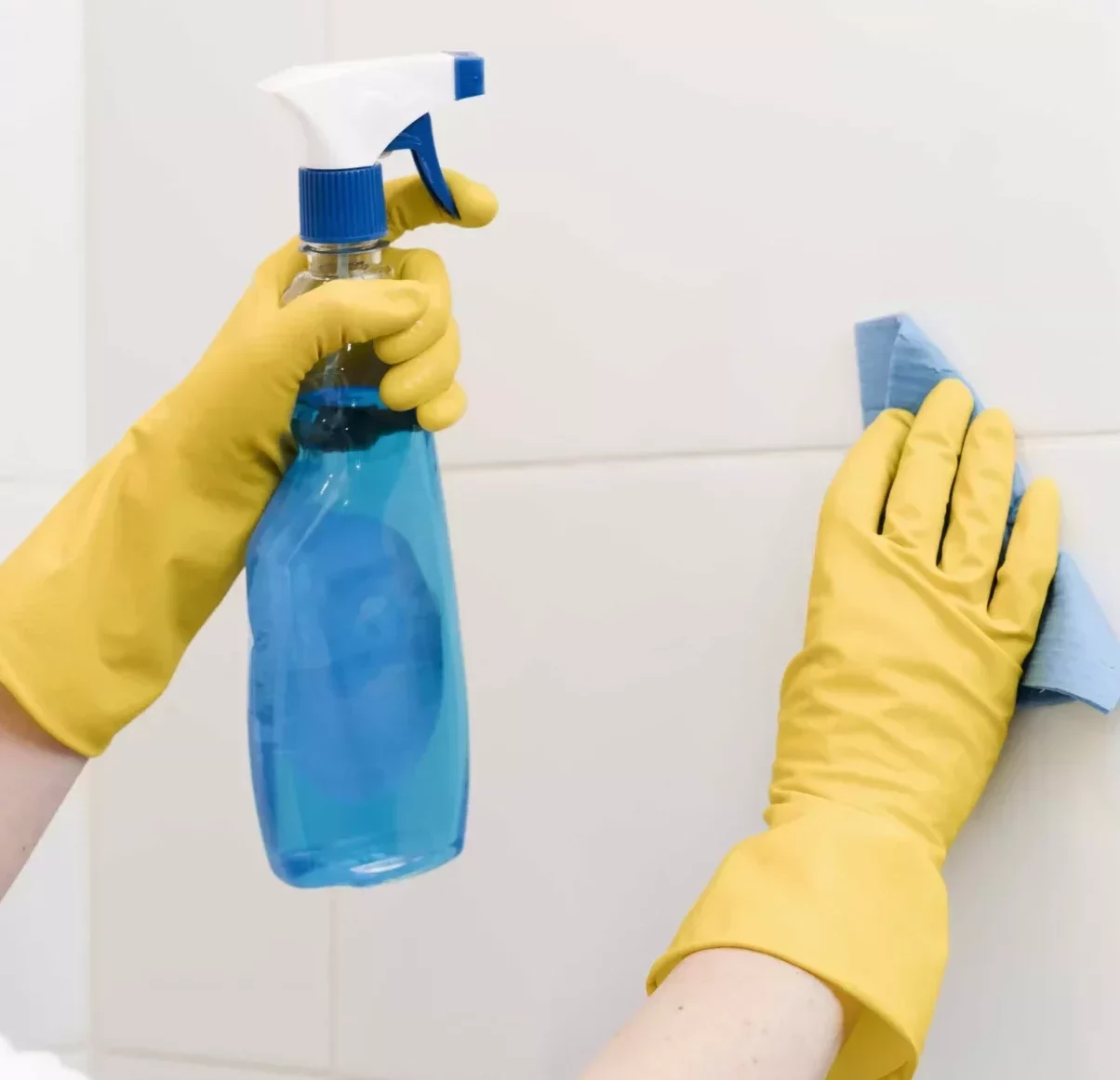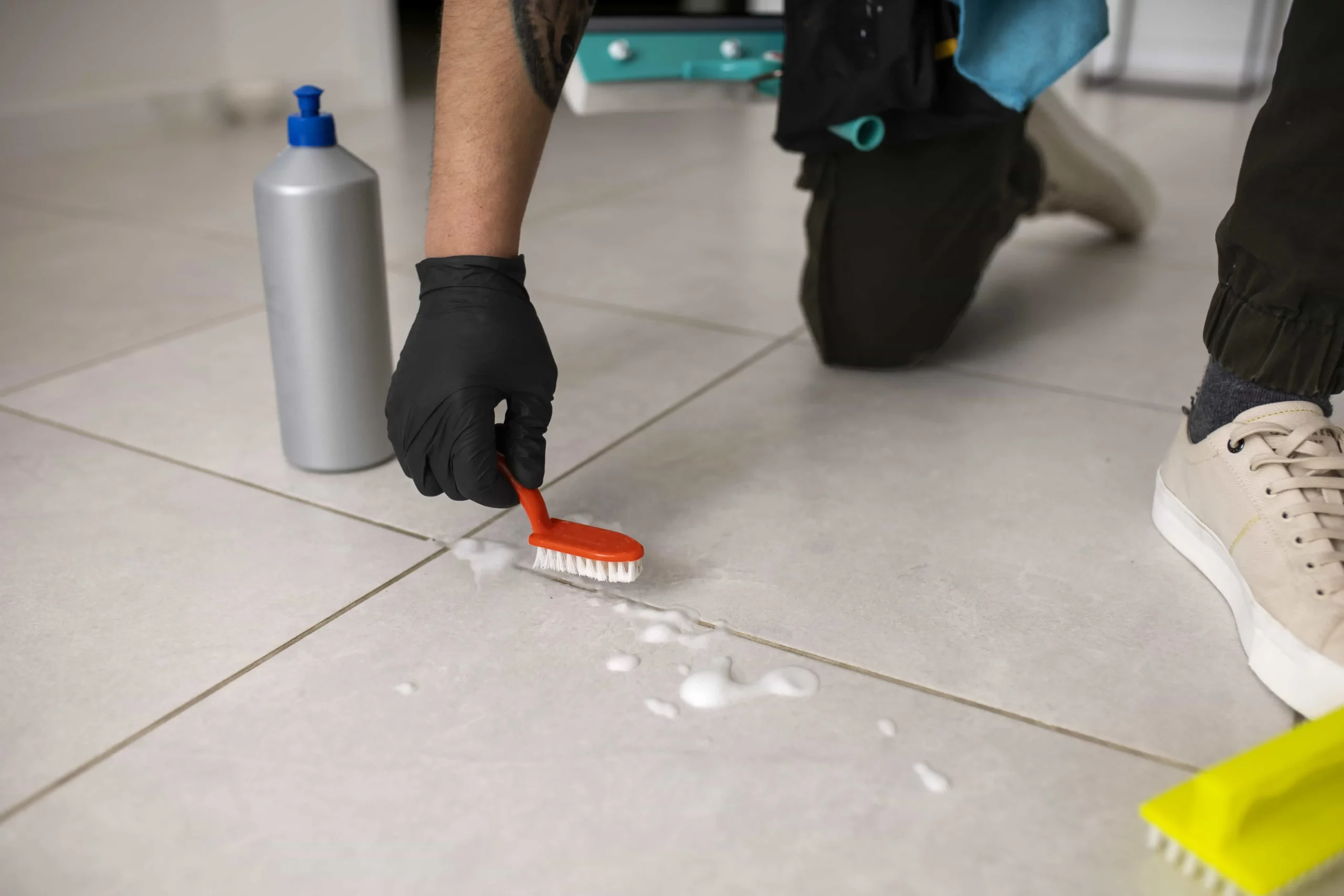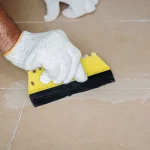It’s not always the tile itself that causes floors and countertops to look old and dingy. Usually, it’s because of the grout between the tiles. Debris, such as water, food, and debris, often runs off the tile and into the groove with the grout. Since it’s hard to remove, it sits there, setting in stains and causing bacteria to multiply.
Grout looks beautiful when it is freshly laid, but without proper cleaning and maintenance, it can become stained, mildewed, and even cracked. If the grout starts to crack and fall, water can seep behind the wall and cause major damage.
Here are some tips on how to clean grout without damaging it. Avoid premature grout replacement by keeping your grout clean, extending its life, and avoiding premature maintenance.

Let Everyday Cleaning Help You
After your bath or shower, a daily wipe-and-spray routine keeps your tiles clean and prevents premature staining and damage. You might find it annoying at first, but it will save you a lot of time and effort in the long run.
To start, you need a good squeegee. Run the squeegee on your tiles and glass walls and doors each time you shower or take a bath to remove excess water.
Following that, you should lightly spray your tile and glass with a mild, daily shower cleaner. Mix a 4:1 solution of water and vinegar or use a green cleaner. There are many cleaning brands that have a daily shower cleaner, so try them all and see what you like best.
By following this daily routine, you will keep your shower or bath clean every day and spend less time scrubbing. This does not mean that you stop doing weekly maintenance.
Weekly Deep Cleaning
Although your walls and glass will be cleaner with your daily routine, you’ll still need to give your bath or shower a deep clean every week (or at the very least, every two weeks). Your daily efforts will not be enough to remove body oils and soap scum from surfaces.
Give your grout a nice preventative clean with a baking soda and water paste every week or biweekly. Rinse with clear water after applying it with a grout brush or a toothbrush. Rather than using water, try hydrogen peroxide to clean stained grout. Make sure you rinse off vinegar thoroughly before using hydrogen peroxide in the grout if you use it as a daily spray.
Cleaning Badly Stained Grout
Grout can become stained and grimy if it is not cleaned properly, either due to laziness or lack of attention. To remove severe stains, you will need to use bleach.
Using a bleach pen can help you concentrate the power of bleach where you need it. Bleach pens are great for small surfaces and a little grout cleaning since they minimize contact with your tile. However, don’t use them to clean your entire grout line. If your weekly or bi-weekly cleaning never feels like it’s quite enough, but you’re not feeling like bleaching your entire tile wall, this is the perfect solution.
If, however, you feel that your grout could be disinfected and stained, begin with an oxygen-type powdered bleach. The chloride-type bleach is gentler on grout than this kind of bleach, and it’s usually enough to remove stubborn stains. Rinse with clean water after applying with a brush. Let stand for 10 to 15 minutes.

How to Avoid Damaging Grout
You can keep your floors and countertops looking good by regularly cleaning the tile grout, but sometimes it can’t be cleaned with in-house cleaners. This is when you can count on our Post-construction cleaning services in & near Commack, NY, to keep your tiles clean. But you also need to keep up with regular maintenance and cleaning between professional cleanings. In case you decide to do it on your own, here are a few things that will help you not to damage your grout:
Don’t Use Too Much Water
In order to clean floors, you need water, but there is a limit to how much you should use to clean grout. As the grout is porous, water will seep into the surface and breaks it down. Not only will you damage the structural integrity of the grout and the tile if you use too much water when you clean, but you may also foster the growth of mold, mildew, and bacteria.
To scrub the tiles and grout, minimize the amount of water you use and instead use an appropriate cleaner.
Don’t Use Coarse Scrubbers
Despite what may seem to be the case, grout is delicate. While it fills the space between the tiles and lasts a long time with good care, it can also be damaged easily. The use of a coarse scrubber such as steel wool can remove granules from grout, leaving holes in it, which makes it more porous and susceptible to damage in the future.
Use a soft cloth or, if necessary, a simple scrubber like what’s on the back of a kitchen sponge. If you need something stronger than that, you probably have set-in stains that require professional assistance.
Don’t Use Harsh Chemicals
The grout will be damaged by harsh chemicals and acids, which will shorten its lifespan. You will have to have the tiles re-grouted, which is an expensive and time-consuming process. Even if the damage is not extensive, it will still allow more water and debris to get into the grout, which will create more stains and odors.
Regularly use mild cleansers to remove dirt before it becomes a stain. If you do it often enough, mopping your floors or wiping down your counters should be sufficient to keep them clean. It’s always a good idea to clean up spills right away. When you fail to perform regular maintenance, stains form, and you have to resort to harsher cleaners that can damage your grout.
Need Some Help?
Keeping grout should be easy if you stick to a daily cleaning routine. But when debris pile up, keeping it clean seems harder and harder. This is where our professional cleaning services can help. Get in touch to learn more about our services. Call now!
Frequently Asked Questions
What should I use for daily cleaning to prevent grout stains?
For daily cleaning, use a mild daily shower cleaner, which can be a 4:1 solution of water and vinegar, or a green cleaner, to maintain the cleanliness of your bathroom tiles and grout.
How often should I deep clean my bathroom grout?
You should aim to perform deep cleaning of your bathroom grout on a weekly or biweekly basis, as daily cleaning alone may not remove all body oils and soap scum from the surfaces.
Can I use bleach to clean severely stained grout?
Yes, bleach can be used to clean severely stained grout. A bleach pen is suitable for smaller areas, while oxygen-type powdered bleach is effective for larger areas. Rinse thoroughly with clean water after applying.
How can I maintain grout without causing damage?
Use minimal water during cleaning, opt for soft cloths or gentle scrubbers, and avoid harsh chemicals. Regular maintenance and prompt cleanup of spills are key to preventing damage.

